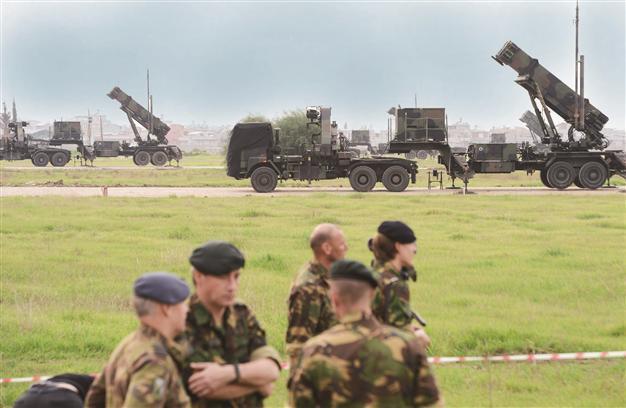Patriots to protect 3.5 mln Turks from Scuds
ADANA - Hürriyet Daily News

The first of the Patriot batteries that belong to the Netherlands, which became operative over the weekend, will protect Adana’s 1.6 million residents. DAILY NEWS photo, Selahattin SÖNMEZ
The overall Patriot anti-ballistic missile system will protect nearly 3.5 million Turks living in towns close to the Syrian border from a potential Syrian Scud missile attack, according to NATO officials. The first unit of the Patriot systems went operational on Jan. 26 in Adana. The remaining five batteries being deployed in Kahramanmaraş and Gaziantep are expected to be active by the end of January.The first Patriot batteries provided by the Netherlands went operational on Jan. 26 and have become fully integrated into the NATO and Turkish air defense system. This particular unit is set to protect the 1.6 million residents of Adana, Turkey’s fourth-largest city, 120 kilometers from the Syrian border.
A second battery of seven launchers provided by the Netherlands is being prepared at İncirlik air base and is to be operational in the upcoming days. The İncirlik base is home to both Turkish and American troops and jet fighters and is known to be the most strategic military facility in the eastern Mediterranean and the Middle East.
Apart from the Netherlands, Germany and the U.S. are also each providing two units of Patriot systems, to be deployed in Kahramanmaraş and Gaziantep.
This NATO-wide deployment is “purely defensive in nature” and has been designed to de-escalate the conflict in neighboring Syria, and also deter any possible threat to the Turkish population and Turkish territory, a NATO official said.
“The air policing is something NATO has been doing for decades already. NATO air defense integrated system has been in place since the 1960s. The only difference is that these Patriot batteries have been optimized to counter the missile threats. They have been optimized and tailored to counter and deter any possible missile threat coming to the Turkish population,” Lt. Col. Darius Kacperczyk, NATO spokesperson, told the Hürriyet Daily News on Jan. 26, elaborating on the rules of engagement for Patriots.
The MoU in on the way
The signature to the memorandum of understanding between the countries sending troops and the Turkish government has nearly been completed, said Kacperczyk.
“As a policy in NATO, we have certain rules that troop-contributing countries cover the cost of the equipment, the soldiers’ deployment and transportation. The host nation is expected to cover first protection, some life support on the ground and preparation of the site.”
The nations have committed themselves for a mission in Turkey up to one year, according to Kacperczyk.
“But as with all the deployments of NATO, Turkey and all the countries involved, they will reassess the mission frequently and they will decide whether to stay for one year, shorten or extend. It will be a constant revision of this operation,” he said.
By default the batteries are mobile, but the specific deployment to Turkey has six sites and the Patriot systems will stay in Kahramanmaraş, Gaziantep and Adana for the whole length of the mission, “because NATO decided to provide these batteries based on Turkey’s request to provide specific capabilities to augment its air defense system which is already robust.”
Nothing to do with Kürecik
Asked about the claims of the main Turkish opposition party, the Republican People’s Party (CHP), that the Patriot system was aiming to protect a NATO radar in Kürecik district in Malatya, the NATO official said there was no link and no way that the Patriot battery could support any other operation.
“If you look at the location of the batteries and the location of the radar, it’s just impossible,” he said.
Major Cengiz Alabacak from the Turkish Air Force told the Daily News 1,300 troops had been assigned for the duration of the deployment of the batteries.
All six Patriot batteries, capable of shooting down hostile missiles in mid-air, will be connected directly to allied air command in Ramstein, Germany. Shells from Syria landed in Turkey on multiple occasions in late 2012, causing five deaths. The Syrian military has also fired Scud missiles at rebel positions within the country, according to NATO.
Scud missiles can carry explosives or other types of payload, for instance chemical warheads. The Syrian regime is believed to hold a sizable chemical arms stockpile that includes hundreds of tons of nerve and blister agents.
The Patriot batteries have a 150-kilometer radar range and have the capability to defend areas against ballistic missiles for 15-20 kilometers. As the Patriot systems will not be able fire missiles into Syria, the batteries will hit any ballistic missile in Turkish airspace.
Asked about the concerns for chemical fallout in case of a missile threat carrying a chemical warhead, officials said the battery engages at a very high altitude.
“We engage explosives at a high altitude. The explosion burns a lot of chemicals and it gets dispersed in the air. I don’t see a much of problem if chemicals are used,” Lt. Col. Marcel Buis, who leads the Dutch operation in Turkey, told the Daily News.
Attack on German troops ‘a shame’
German soldiers stationed as part of NATO’s mission to deploy Patriot air defense systems in the Mediterranean port of İskenderun were attacked by a group of Turkish activists last week.
“That’s a shame. I am confident that we’ll not be engaged in that,” Buis told the Daily News.
NATO approved their deployment in December, saying the use of ballistic missiles by the Syrian regime posed a threat to Turkey and insisting that the move was purely defensive.
NATO also deployed Patriot batteries to Turkey during the U.S.-led invasion of Iraq 10 years ago. They were never used and were withdrawn a few months later.
















